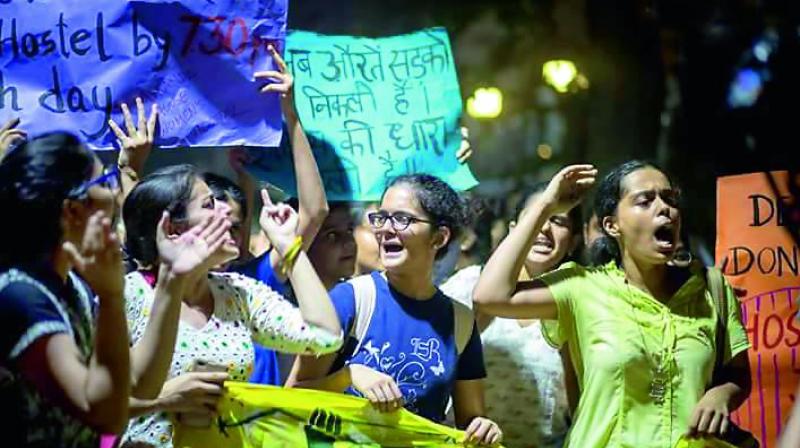Devotion to one, deception to another

During Diwali, Goddess Lakshmi is revered upon. She’s regarded as the harbinger of prosperity and wealth. On the one hand, we revere women, placing them alongside the Goddess herself, and on the other, we blame them and shame them. We limit them on the pretext of providing safety. Sexual abuse happens, not because a woman wears provocative clothes or because she goes to a bar. Not also because she smokes, drinks, or flirts.
A rape happens because of the rapist. Yet, we point fingers at the woman. Recently, a video of a couple on the Delhi metro — filmed without their consent — was posted on Facebook. While the video, now deleted, showed the couple simply holding each other, the person who posted it shamed the girl for indulging in public display of affection. “I feel bad for people who don’t teach their daughters any shame and then say women are not safe in our country. If such shamelessness continues, women will certainly never be safe,” the user had reportedly written, ignoring the fact that a man was also involved.
Blaming the woman has become a common practice across the country. Whether it was the Maharashtra politician Asha Mirje blaming women’s clothes, behaviour and “presence at inappropriate places” for rape, or West Bengal sports minister Madan Mitra questioning a rape survivor going to a nightclub “so late at night”, the reach of this mentality is widespread. “When we look at the culture and instances of sexual violence, the blame is always on the woman for creating the problem, while perpetrators of the crime are looked upon as innocent people,” says Dr Ranjana Kumari, Director of the Centre for Social Research, adding, “It’s a typical patriarchal, misogynist mindset.”
Women’s rights lawyer Flavia Agnes adds, “Are we an open society or a closed one? If she’s holding hands, she’s consenting to it, and yet people make it a public issue. That, according to me, is the problem. Anybody can now film people on their phones and can upload it. And every time, it’s the woman who gets blamed and comments are made on her character.” One way of fighting this misogyny is through mobilising support, especially from women, believes Devangana Kalita, who is a part of the Pinjra Tod movement in Delhi’s universities. The movement, started a year ago by her and other women, fights sexist rules at colleges and hostels, through demonstrations and marches. “The universities are reproducing patriarchal mindsets, putting the blame on the women and locking her up, instead of providing us opportunities to explore educational opportunities and the city. Libraries may be open till 12 am, but the hostel curfew is at 8.30 pm,” Devangana says, “Consensual sexual relationships are criminalised, but actual sexual assaults are ignored.”
While most agree that open dialogue and campaigns across mediums is needed to help change this mindset, moral policing and vigilantism, too, need to be curbed. Kavita Krishnan, Secretary of the All India Progressive Women’s Association, says, “The attitude of authority needs to change. A lot of things that the police does in the name of women’s safety is moral policing. I haven’t seen a single government, or minister of any state stand up and say ‘In my state, moral policing by police, individuals or groups will not be allowed’. That’s part of public safety for women.”

